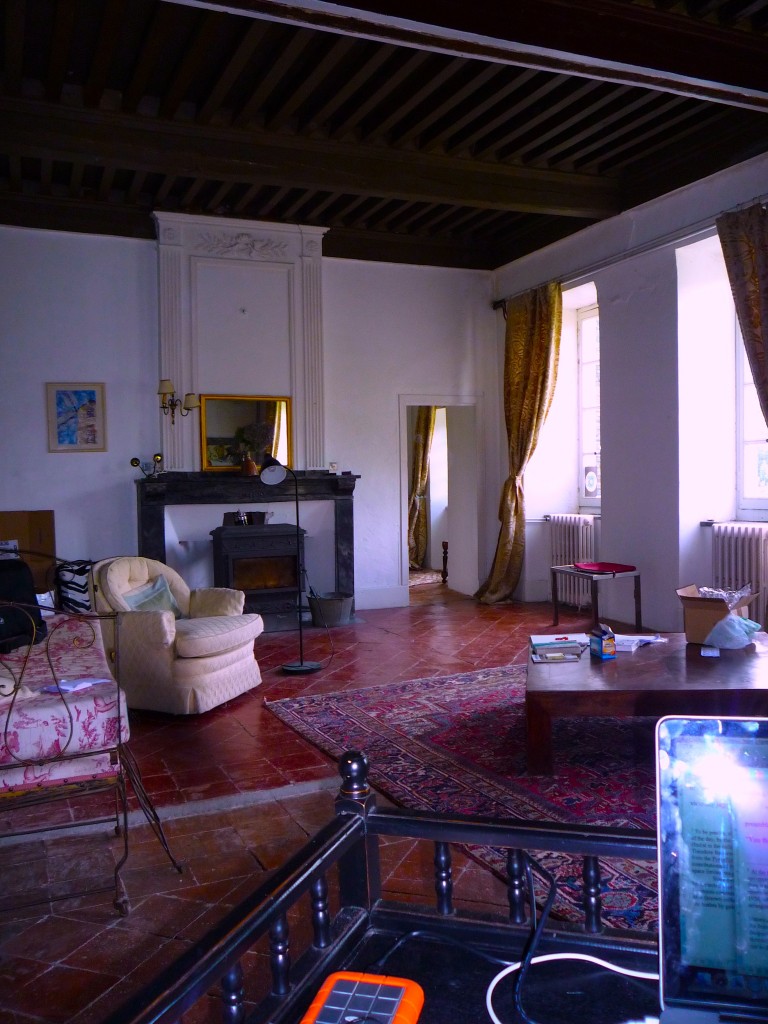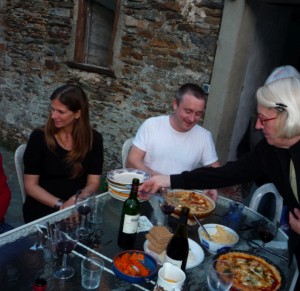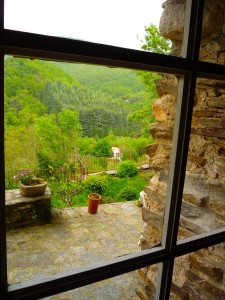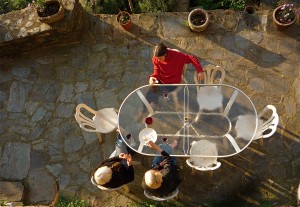
Yesterday, I began an interview with Kerry Eielson and John Fanning, the brave souls responsible for running the remote writing retreat from which I have recently returned, La Muse. Since I utterly forgot to run a basic description of the place yesterday, here are the basics:
La Muse Writers’ and Artists’ retreat in Southern France is located in an ancient village perche called Labastide Esparbairenque, in the historic Aude department of Languedoc. We provide a space where artists and writers can work in a peaceful, isolated and inspiring setting. We have hosted poets, novelists, non-fiction writers, screenwriters, painters, visual artists, photographers, chefs, composers, directors, healers and more. Rooms are available to barters, recipients of fellowships and grants, and to individuals who apply directly through La Muse.
The house overlooks its own intimate valley and river. Enjoy magnificent views from every room as well as from our terrace and gardens. On breaks from work, go wine tasting, visit local markets, swim in the nearby lake or just enjoy nature. We are located in the midst of the French national walks system, where well-marked trails scribble the countryside.
What we offer is quite specific: time and space to create among peers, and access to nature, culture and good food. The retreats create a rewarding environment for attendees as well as our ever-growing artistic community. So come create and participate in a growing creative community, one that encourages artistic diversity as well as an exchange between cultures from all over the world.
Something I also neglected to mention yesterday: you’ll find the application here. Even if you are not in the market for a retreat experience, you might want to take a quick gander at the application requirements, as they are relevant to what I’ve been talking about for a week now — and speak very directly to our topic du jour, which is all about how people write their way into someplace like La Muse.
Why veer away from the daydream-worthy retreat experience to talk about something as practical as what makes a winning application? While I could post for weeks on what day-to-day life is like at La Muse and similar artists’ retreats — I could, for instance, have blogged about it on a daily basis while I was there — my first priority in this interview series is to glean as much practical information as possible for those of you who might be considering investing in some serious retreat time.
So for this part of the interview, I ruthlessly turned the conversation toward a topic we pursued a few days ago: residency applications, fellowships, and just how writers’ retreats decide who should and should not come.
Did I just hear a gasp of disbelief from those of you who have never tried to gain acceptance to a formal writers’ retreat? Almost universally, it’s not enough to show up on with the requisite fee, a burning desire to write, and the time to do it: very few artists’ colonies are willing to take everyone who applies. As I mentioned on Monday, serious retreats require an application packet that demonstrates not only the potential applicant’s willingness to retreat, but talent and professional acumen.
Knowing how I love you people, was I going to allow a rare opportunity to grill folks who evaluate writers’ retreat applications on a regular basis?
Of course not. Let’s join the conversation already in progress — and to humanize the potentially fearsome souls on the other side of the application envelope, here’s a snapshot I took of Kerry and John at a moment of retreat conviviality. (Those two homemade vegetable pizzas were fresh out of the oven, incidentally.)

Anne: Something I’ve noticed that we have in common is our strong belief that writers should help one another. Since you are so supportive of writers at every stage of their careers, why did you decide to establish an application process, rather than just accepting anyone who wanted to come?
John: People need to know what it is they are coming here for. It helps them and us to know exactly what they are going to be working on. Otherwise they get frustrated and annoyed with themselves for wasting their own time.
Kerry: We wanted to make sure people didn’t expect Club Med.
Anne: Oh, I know that kind of retreater: ostensibly getting away from everything to write, but outraged to learn that there isn’t round-the-clock room service and a shopping mall with a movie theatre next door to the retreat.
Kerry: We really want people who are going to benefit from La Muse in the way we intended, people who are coming to work on a creative project. We charge significantly less than a B&B of comparable quality. If we wanted people on vacation, we’d run a hotel.
We also want to make sure that interested writers and artists know that the house isn’t by aim social (though conviviality is a nice boon), and that everyone else here at any given time is here to be absorbed in a solitary, creative activity.
The best way to convey all that is to make it official, ask them why they’re coming, and help them get organized before they come.
Anne: I’m going to toss tact to the four winds and come right and ask what every writer who applies for a residency most wants to know: what do you like to see in an application? In general, what separates a strong packet from a weak one?
Kerry: First and foremost, I respond well to someone who is both professional and personable. I like a polite, formal but warm address, something respectful but not rigid—good attributes in a small community setting.
Anne: That makes a lot of sense; it’s the same note an aspiring writer should strike in a query letter or pitch. Since capturing that tone puzzles many writers, do you have any pointers on how to achieve that balance in a first approach or application?
Kerry: Write the email like a good old-fashioned cover letter. Answer the points and include the documents we request on the how-to-apply page of our website. Show us you’ve done some research, and have at least read the website.
Anne: I can’t tell you how often I’ve heard agents say precisely the same thing about querying. Queries, pitches, and applications that seem unsuited to the recipient tend not to go over well.

Anne: Anything else?
Kerry: I love an application that doesn’t have any parts missing. That said, if something’s missing in an otherwise good application, I ask for it; I point out errors.
Anne: That’s incredibly nice of you, considering the volume of applications you must receive. I’m constantly regaling my readers with horror stories about how Millicent the agency screener and Mehitabel the contest judge just toss back queries, submissions, and entries that don’t follow the rules.
Kerry: I lost a great job due to an error on my resume; it was a good lesson that I can gently pass on by pointing their mistakes out to applicants. No matter how good the writing, I will not forward an application to John with typos.
John: Typos. That’s a good example! That gets me going. All right, with an artist I can understand this to an extent in an email, but a writer. That’s your job! As Stephen King would put it, it’s part of the toolbox you carry around with you everywhere.
Anne: They’re a pet peeve of mine, too, and most of us who read manuscripts for a living. Nothing says, “I didn’t bother to proofread this before I submitted it,” like a bouquet of typos.
John: Spell-check is not only important, I feel, but mandatory. If you can’t spell-check an application, then that’s a red flag.
Anne: Hear that, readers? Is this where I get to say I told you so?
John: An electrician doesn’t go to work without a screwdriver. Why would a writer go to work without a tool as simple as spell-check?
It’s the little things that tell you so much about an applicant. It’s just like with title pages for screenplays or books. You don’t do massive block capitals on a front page. It’s done a certain way and if you don’t do it that way then you get onto the slush pile with all the rest of the unprofessionally presented things. Like, you don’t say that a ms. is copy written, it’s just understood.
Anne: That’s a hard one to get writers brand-new to the biz to understand. They think that it looks more professional if a title page or footer contains © Neophyte McWriterly, but to the pros, it’s just the opposite.
John: You are a professional. You copy write everything before you even send it to a friend, never mind an agent or house. It works the same way with a retreat. Give what you’re asked for. Don’t give what you imagine someone wants and be professional about it.

Anne: What other kinds of things really turn you off in an application?
John: Actually, we don’t really get that many problematic applications and when we do, we see the red flags straight away. They are the type of application that draws attention to themselves very quickly.
Kerry: Honestly, unless it has something to do with the project (and in that instance it’s perfectly acceptable), I don’t want to know about someone’s political, religious, or sexual orientation in their introductory email or application—again, unless it’s related to their project.
Anne: That’s interesting — that’s another one I hear from agents and contest judges quite often. Aspiring writers often seem to assume that the person reading their applications, query letters, or entries will be exactly like them. The world’s just a whole lot more diverse than that.
Kerry: I like opinionated people, but in retreat settings it’s good to have people who are able to be discreet when in the company of other religions, political and sexual leanings, or in a professional exchange. It’s best for a person not to assume that everyone will jump aboard his or her bandwagon. I believe it’s best for that information to come out over dinner (where it always does, we can bash Bush till the sun rises) than in an application.
As well, I don’t want my opinion to get in the way of accepting a talented artist with a perfectly acceptable application. We’re fortunate to have very high quality applications most of the time.
Anne: Let me turn the question around: what would your dream applicant be like?
Kerry: Talented.
Anne: I like that. Is that orientation how you end up welcoming such a broad range of ages and levels of professional accomplishment? In the two groups of retreaters when I was in residence, I was struck by the diversity of personalities and ages: in my first cohort, there was 26-year-old and a 74-year-old. And both were indeed very talented writers.
John: The range of ages, cultures, the diversity, is what makes La Muse so great, I feel. The last retreat, we had an Irishman, an English couple, a South African who lives in Grenoble, a New Zealand couple, a Canadian who lives in California, and the previous retreat there were Americans and…it goes on. We love the diversity and so do the people that come here. It’s fun to find out about other cultures and ways of thinking and living and what they read and love. It informs and elaborates your experience here.
Anne: Was there something about our applications that told you that all of our personalities would mesh well?
Kerry: People usually get along. The odd time there is some kind of tension, people are grown-up about it. After all, they all came here for other reasons, anyway.
Anne: So applicants not good at dealing with others tend not to be looking for this kind of retreat? Or is it that the artists who are drawn to a place with a communal kitchen are expecting to make friends?
Kerry: People who come here have a lot in common, no matter their age or art form. They’re smart, interesting and creative. They like to travel. They like nature. They like France and its food, language, history and architecture. They’re serious about what they’re here for. They want to work alone in their room with the option to see a friendly face, ask for advice, to walk or cook with another person.
Anne: I’m glad you mentioned that, because I suspect that many gifted aspiring writers who might hugely enjoy a formal retreat are fearful of spending a great big chunk of time alone, staring at a computer screen. But I’ve met some of my best friends at retreats; if everyone is serious about working, it’s definitely possible to get a lot done and still have social contact. And that’s great, because retreaters tend to be such interesting people.
I also suspect that most aspiring writers don’t know that being admitted to a serious retreat is a respected professional credential, something to catch an editorial or agent’s eye in a bio or query letter.
John: It’s just another thing that says I take what I do seriously and am willing to commit time out of my life back home to that end.
Anne: Has it been your experience that Musers use having attended as a writing credential later on?
Kerry: Yes. They also use each other as references for jobs or other opportunities; they use each other as readers for manuscripts, and have collaborated with each other on all kinds of projects. We get a lot of writers who at La Muse find illustrators for their books!
John: Not only that, but we put new Musers in touch with previous ones. We’ll get people to send their work to other attendees that have been here before who are editors of reviews or heads of writing programs or to agents or editors at publishing houses. The most important thing that attendees get, though, is the reward of knowing that they’ve attended a retreat and because of that they will put it down on their CV/resume because to people like agents, editors, marketing departments, it shows a broader outreach of your potential readership or buyers.
Anne: I’ve noticed over the years that going on a formal retreat can do a great deal toward helping a writer think of herself as a professional — as in, “Hey, these people who screen residency applications all the time think I’m talented enough to take seriously; maybe I should be thinking of this as my life’s work.”
But since this is an interview, I suppose I should be asking questions, rather than making statements. So I’ll ask you: speaking as people who get to see many attendees grow and change over the course of their retreats, what seem to be the greatest benefits?
Kerry: It’s deep immersion, which makes room for inspiration. It’s genuinely exhilarating and puts people back in touch with why they became artists, why they do what they do. When in your real life do you really get a chance to have uninterrupted focus on your work?
John: Exactly, it’s a gift to yourself to go on a retreat. The vast majority of attendees leave La Muse revitalized and re-inspired.
Anne: That’s a good thought to leave my readers pondering, so I’m going to break here for today. Thanks, John and Kerry, for sharing your experience with all of us here at Author! Author!
I’d also like to throw the question to all of you out there: what is actually necessary for you to take your writing seriously as your art, rather than as just a hobby? Most of the successful authors of my acquaintance can point to a specific event, level of recognition, or decision on their part — what is it, or will it be, for you?
As always, keep up the good work!